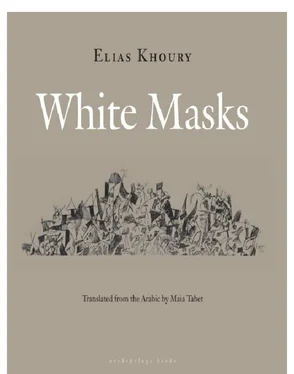I flatly refused-I take pride in my work. But those two at the back, they agreed. Of course things won’t be like this forever; everything comes to an end. The war will end and, in the fullness of time, good will prevail over evil. And when our occupation recovers the respect it deserves, they will appreciate my integrity, and they might even promote me to supervisor. And I’ll sit behind a desk without lifting a finger all day, answering the telephone, registering people’s complaints and settling their problems. Still, we must bide our time and wait: everything in its own good time.
But these new fellows, especially that devil Mohammad al-Kharroubi. Who does he think he is?. . Just yesterday, he asked to sit beside the driver, leaving me to hang off the back of the truck! What complete disregard for age or seniority! Me, a garbage collector of twenty years’ standing, and him scarcely out of his teens. . if I’d married a little earlier, he’d be the age of my children!
I regret not having listened to my mother’s advice now. She always told me to marry early, but I wouldn’t. I wanted to have some security before getting married. How could I marry with nothing more to my name than fifty lira? I said no, my mother said I’d get too old, but I still said no.
Then, may he rest in peace, my uncle Hajj Mahmud ’Alloul came to visit. After we all sat down, he spoke to me and my mother and then put his arm around my shoulder.
“Zayn, you’re not married, and Husniyyah is your cousin. I kept her for you. (I never asked him to!) Your late father, before he died, made his wish known to me. ‘Mahmud, Husniyyah is for Zayn,’ that’s what he said.”
“When shall we sign the contract, my dear?” he asked, turning to my mother.
“Tomorrow, with the blessing of the Almighty,” she replied.
So they signed the contract, and I married Husniyyah. She’s a good woman, Husniyyah. Cooks and cleans and looks after the children. But she’s come to hate my mother. “Don’t you fear the Lord, woman?” I ask her. “Were it not for her, I wouldn’t have married you!” But Husniyyah just grumbles on. And what can I do? Throw my mother out on the street? I can’t do that, a woman of her age, and paralyzed — from her stroke. The doctor said there was no hope, so we brought her back home. But she can’t walk, and every time she has to urinate, Husniyyah complains. No, bless her, she doesn’t complain, she’s tired though. An invalid is a burden. My mother doesn’t complain either, she spends all her time reading the Qur’an and praying. . And now this al-Kharroubi fellow here wants to take my place in the truck, he does, as if there were no levels or seniority! I’m the boss around here; Mr. Kabbani said so, he said it in so many words: “You’re like the captain of a ship,” he said. I’m responsible for the entire area’s garbage collection, and he expects me to stand on the fender at the back of the truck! He insisted, you know, and if it weren’t for the driver’s intervention, we would have come to blows. A fine man that driver is, and he’s fond of me too, he knows I’m conscientious and that I always look out for them so they don’t work too hard. Anyhow, the driver stepped in and al-Kharroubi went back to his place, behind. I sit beside the driver and ask him to stop whenever there’s a proper pile of garbage to collect, then the two at the back hop off and shovel it onto the truck. I don’t always get down… I used to before, but I’m tired now and I’m entitled to a rest. When the pile is really huge, then I get down and help: I take the shovel and let one of them rest while I work in his place.
“What are all these people doing here, sitting in front of their cars sipping coffee?” the driver asks, puffing on his cigarette in the front cabin.
Yes, thinks Zayn’Alloul, what are they doing there? People have become so. . Oh, well. . may the Lord preserve us from people!
As the truck rumbles on its way in the early morning haze, it passes a group of fishermen and fishmongers. Zayn asks the driver to stop and gets down to ask about the price of a kilo of fish.
“Forty lira,” the fishmonger replies, as he lifts up the large wooden crates and pushes the ice aside for Zayn to see.
Zayn doesn’t buy any fish. How is he supposed to come up with forty lira just like that? So he walks away. He sees a child crouched next to a crate full of fish, selecting a piece and dipping it in a bucket of water.
“What’s this?” he asks.
“Frozen fish.”
“Why the water?”
“So the fish defrosts and we can sell it as fresh.”
White, dead fish… Zayn picks one up but it slips from his grasp and he hears al-Kharroubi yelling: “We’ve got to get a move on! We’re late!”
Zayn is tempted but the feel of the fish makes his flesh creep, like that time when he kissed his dead father’s hand before the burial. He gets back into the truck. It continues on its way. The driver says he thinks frozen fish is alright, it’s cheap. The truck rumbles on, now it’s almost at the last stop, at the UNESCO roundabout. There’s always a big pile of garbage here, so they all get down and shovel, and after they are done, they head for Shuwayfat. Zayn sighs with relief: soon, he’ll be home, having a glass of tea and a cigarette. He doesn’t like to smoke on the job. A cigarette doesn’t taste the same when you’re working. At home, with a glass of tea, then it’s a cigarette.
The vehicle brakes, everyone jumps out, and the clanging of the shovels begins. Zayn too hops out of the truck.
“It’s an even bigger lot than usual.”
Mohammad al-Kharroubi and Saleh Ahmad grab their shovels, and the garbage starts cascading into the truck.
“Boy, what’s that smell?” Saleh Ahmad asks.
“Burning,” replies Zayn as he bends down and gestures to the charred contents of the garbage.
“No,” the driver says. “It smells like. . a dog… a dead dog.”
Zayn steps closer to the statue of Habib Abi Shahla. Yes, it really does smell like there’s a decomposing dog.
“That’s not part of our job,” Saleh Ahmad says, tossing his shovel aside.
“Take it easy, man.”
“No! Let them bring in the bulldozer! I’m not about to pick up a contaminated dead dog.”
Mohammad al-Kharroubi hops gingerly across the garbage toward the statue.
“Uh-oh!” the driver says. “He’s going back to his filthy old habits. Last time, he picked up a rat by the tail and dangled it under our noses. It was disgusting!” The driver climbs into the truck and rolls up the window.
Al-Kharroubi steps forward and, with his bare hands, pushes the garbage to one side and chuckles loudly. Pushing and toiling, his clothes gradually blacken as the soot from the burnt and charred refuse rubs off onto them. Then, an almighty exclamation as the man’s voice shudders and his face freezes.
“It’s a man!”
“What do you mean, a man?”
“The corpse of a man. A man’s corpse.”
Mohammad al-Kharroubi lurches back and is violently sick. Hands on his belly, vomiting yellow-green liquid, he backs away towards Zayn ’Alloul.
“I tell you, it’s a man. . the corpse of a man. Dear God in heaven!”
The driver gets out of the truck and stands next to Zayn ’Alloul. Saleh Ahmad approaches cautiously, reaches al-Kharroubi, and then backs away, spitting and cursing. Zayn advances. He can see the corpse: a man lying on his back, his chest completely bare, with traces of burns on the hands, his body pierced with bullets.
“What are we going to do?”
“Listen, fellows,” the driver says, “we should notify the police, or else they’ll frame us for it.”
“No, we should just leave; we haven’t seen or heard anything, and that’s all there is to it,” al-Kharroubi says.
Читать дальше












